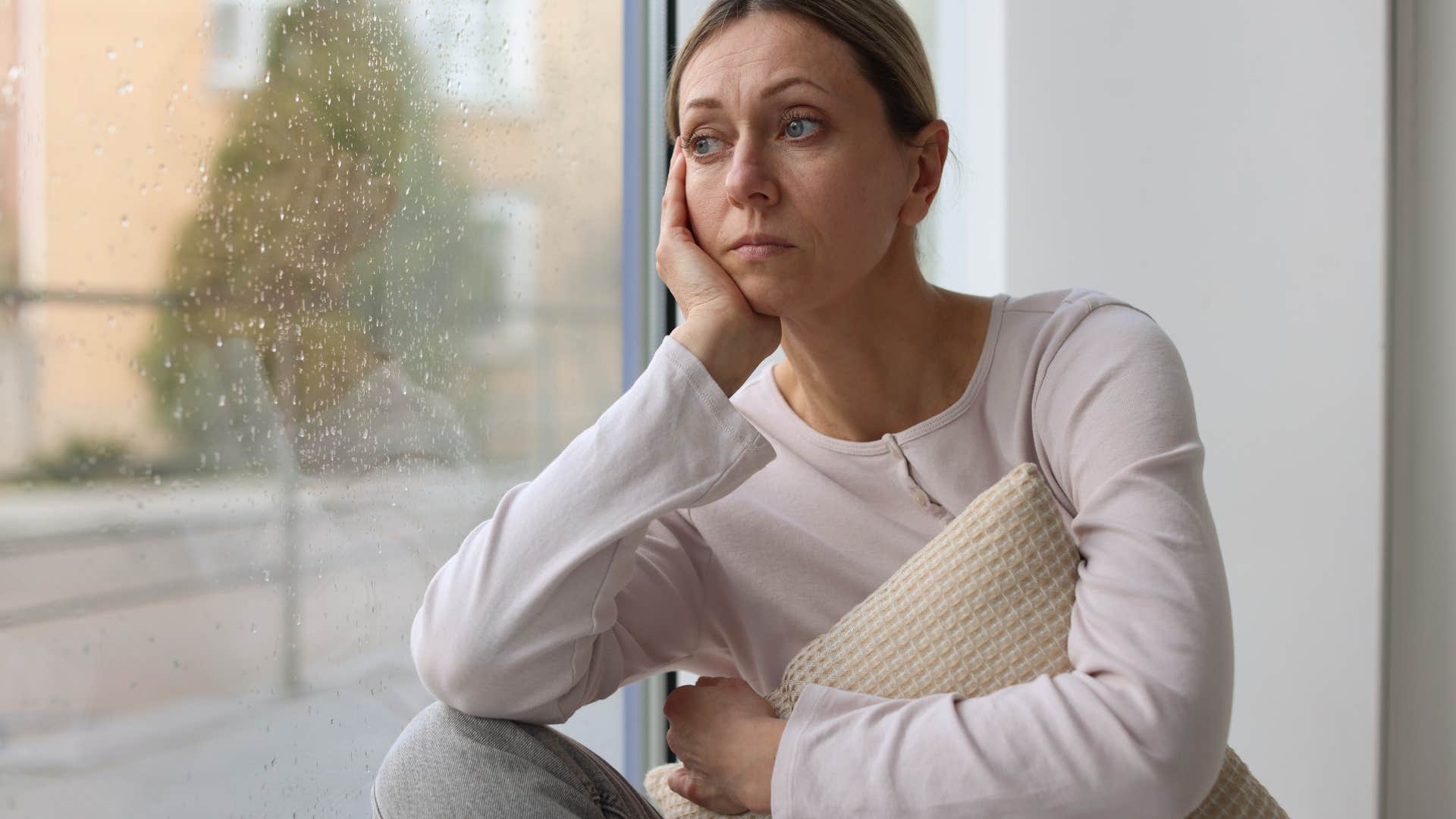People With Absolutely Zero Emotional Resilience Do These 11 Things On A Regular Basis
They way a person behaves may show how emotionally resilient they are or aren't.
 Maralem / Shutterstock
Maralem / Shutterstock When a person struggles with having zero emotional resilience, they find it difficult to manage their emotions. They become avoidant and use unhealthy coping mechanisms to provide temporary and immediate relief rather than focusing on the long-term gratification they would experience from dealing with their feelings.
This process of using unhealthy things to defend themselves against their emotions has lasting negative effects. Their brains struggle to understand how to cope with anything that causes them discomfort, creating a difficult cycle to break. However, it's not impossible.
People with absolutely zero emotional resilience do these 11 things on a regular basis
1. Ignore problems
 Prostock-studio / Shutterstock
Prostock-studio / Shutterstock
When a person has absolutely zero emotional resilience, they may choose to ignore their problems rather than confront them head on. Since they lack the capacity to cope with emotionally painful problems, they make it a point to avoid dealing with them in order to try and protect themselves from the pain.
By constantly ignoring problems, these people train their brains to believe that anything that could potentially cause pain is dangerous and bad, and on top of that, they start believing that they should feel bad for not feeling great. “And this is why so many people struggle to be resilient in the face of painful emotions: Every emotion instantly becomes a double emotion when you’ve trained yourself to see them as dangerous,” explains Nick Wignall, a board-certified clinical psychologist.
2. Cancel plans to avoid discomfort
 Anton Mukhin / Shutterstock
Anton Mukhin / Shutterstock
Someone who has no emotional resilience will typically cancel plans if they believe that those plans will lead them to feel discomfort. Avoiding the situation is their immediate way of trying to cope because they know that it will likely cause them some relief in that moment.
Anchor Therapy, a company that aims to provide counseling to individuals who struggle with their mental health, relationships, trauma, and more, said, “When you cancel plans because of anxiety, you are essentially just avoiding something that makes you uncomfortable. This avoidance will make you feel better in the moment, but it reinforces the idea that the situation was dangerous or mentally unmanageable. Over time, your brain will begin to associate similar situations with fear.”
The cycle of avoidance will continue to repeat itself because the person will start to view other situations that cause them anxiety or discomfort as things they also need to avoid.
3. Procrastinate
 fizkes / Shutterstock
fizkes / Shutterstock
When a person has zero emotional resilience, they will procrastinate certain tasks. This is due to their inability to properly manage the potentially uneasy emotions that could arise while completing the task.
To complete a task that may cause emotional distress, the brain has to be able to manage emotional suppression and delay gratification, explains Grant Hilary Brenner, a psychiatrist and psychoanalyst. If the brain cannot do this, which is likely the case for someone with no emotional resilience, procrastination will likely occur.
4. Use unhealthy distractions
 Petrovicheva Mariia / Shutterstock
Petrovicheva Mariia / Shutterstock
For someone who has no emotional resilience, they most likely do not care how they acquire immediate relief. They want to achieve it so that they can cope with how they are feeling. This lacks the processing and healing from certain emotions that need to take place in order to really build a tolerance for emotional pain.
“Unhealthy coping skills are strategies that might provide temporary relief from stress or emotional pain but ultimately lead to negative consequences, affecting one’s mental, emotional, or physical well-being. While these mechanisms might seem like quick fixes in moments of distress, they can exacerbate problems, create new issues, or hinder long-term healing and growth,” mentions Positive Reset Eatontown Mental Health Clinic. Using unhealthy distractions to cope won’t just happen once. It will become the person’s way of always coping, and it will damage their emotional resilience more and more each time they do.
5. React to things aggressively
 PeopleImages / Shutterstock
PeopleImages / Shutterstock
When a person gets aggressive over even smaller things, it may be due to their lack of emotional resilience. The inability to effectively manage emotions makes it difficult for these individuals to tolerate any stressful feelings they may be having due to a certain thing.
Emotional dysregulation is a brain-related struggle that makes it hard for a person to manage the way they are feeling and their emotions. Cleveland Clinic explains, “In the most severe cases, people with emotional dysregulation may become aggressive or violent because of difficulties controlling their emotions. Others may behave recklessly or in a way that puts them at risk for serious injuries or death.”
The person may not want to act as angrily as they may be in a certain situation, but they lack the emotional capacity to handle the situation in any other way.
6. Spiral over small things
 fizkes / Shutterstock
fizkes / Shutterstock
When someone lacks emotional resilience, they may spiral over even the small things. It is difficult for their brains to manage negative emotions. Therefore, they view even minor emotional inconveniences as being major threats.
Calm, a mental health company that helps people manage stress and live more mindfully, suggests that, “In the context of mental health, spiraling refers to a cycle of negative thought patterns that can escalate and become overwhelming. Catastrophic thinking, when we envision worst-case scenarios, is often linked to spiraling.” When trying to break the spiral, practicing mindfulness and learning not to believe everything they think may help a person escape their negative spiral. Consulting with a professional is, of course, always an option as well.
7. Blame others for their feelings
 Antonio Guillem / Shutterstock
Antonio Guillem / Shutterstock
Blaming others for their feelings is common for someone who has zero emotional resilience. Instead of dealing with any guilt or shame that may accompany certain feelings, they would rather cope with these emotions by putting the blame on someone other than themselves.
“Blaming others is, essentially, ‘blame avoidance.’ Like all defense mechanisms used to evade uncomfortable feelings, blame is considered a form of emotional avoidance. Blaming others for how we express inappropriate actions enhances our sense of being justified for those actions,” explains Katy Kandaris-Weiner, a licensed professional counselor. However, this coping mechanism can become a major issue that impacts a person’s ability to take responsibility and articulate their needs.
8. Constantly judge themselves
 DimaBerlin / Shutterstock
DimaBerlin / Shutterstock
When someone has no emotional resilience, they will likely judge themselves constantly. Without emotional resilience, managing adversity and the struggles that come with low self-esteem becomes very difficult.
The inner critic negatively impacts a person’s self-esteem, and continuously judging oneself leads to a toxic cycle of coping with the potential negative comments from others by being the first one to negatively comment on themselves instead. This is a dangerous way of aiming to cope with emotions and protect themselves, but they do not possess the emotional resilience to handle it in a healthier manner.
9. Feel like a victim all the time
 MAYA LAB / Shutterstock
MAYA LAB / Shutterstock
A person who has zero emotional resilience will constantly feel like a victim in certain situations. Having low or no resilience will leave them struggling to deal with circumstances that limit their control.
When they feel powerless and unable to persist through challenges, they will start viewing themselves as a victim, and they will likely emotionally shut down. This can lead a person to feel very depressed and not understand how to manage the overwhelming emotions they are experiencing.
Charlie Health, a team dedicated to providing individuals with behavioral health treatment, mentions that, “This sense of powerlessness can reinforce a victim mindset, making it difficult to take personal responsibility or believe that change is possible. Over time, this emotional stagnation can deepen the depressive cycle and hinder recovery.”
10. Engage in negative self-talk
 New Africa / Shutterstock
New Africa / Shutterstock
Someone who has no emotional resilience will, at times, rely on ineffective ways to cope with the way they are feeling. One of these coping mechanisms is engaging in negative self-talk.
Without emotional resilience, most people will not understand how to manage and handle the overwhelming emotions they are experiencing. Due to this lack of understanding, they will manage their distress by making themselves believe that they should not even try to overcome difficult situations or emotions because it is out of their control and pointless. They will start making themselves believe that they are incapable of handling these things in order to make themselves feel okay with avoiding the challenge.
11. Avoid hard conversations
 fizkes / Shutterstock
fizkes / Shutterstock
A person who has no emotional resilience will view hard conversations as a potential threat. Since this is the way their brains perceive conversations that might be difficult, they will likely avoid them at all costs.
Difficult conversations are usually accompanied by an overwhelming amount of emotions, and for someone who is not exactly sure how to respond to and manage these emotions, hard conversations can seem very daunting. Even if someone is struggling with a lack of emotional resilience, there is a way for them to build up their resilience. By making space for their emotions, working on building the connection they have with themselves, and accepting that they may need professional help healing this part of themselves, they can overcome their emotional struggle.
Kamryn Idol is a writer with a bachelor's degree in media and journalism who covers lifestyle, relationship, family, and wellness topics.

